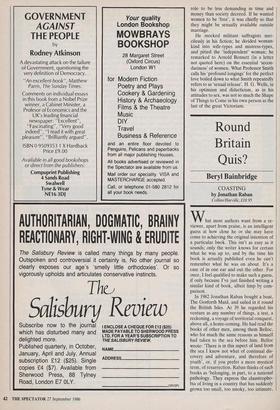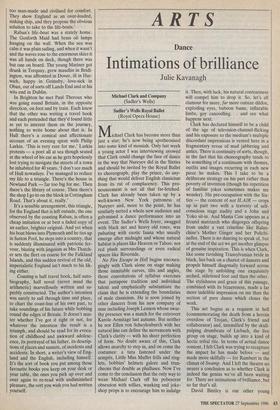Round Britain Quis?
Beryl Bainbridge COASTING by Jonathan Raban
Collinsl Harville, i70.95
What most authors want from a re- viewer, apart from praise, is an intelligent guess at how close he or she may have come to achieving the original intention of a particular book. This isn't as easy as it sounds; only the writer knows for certain what he was up to, and by the time his book is actually published even he can't remember what he was on about. It's a case of in one ear and out the other. For once, I feel qualified to make such a guess, if only because I've just finished writing a similar kind of book, albeit limp by com- parison.
In 1982 Jonathan Raban bought a boat, The Gosforth Maid, and sailed in it round the British Isles. At 39 he regarded his venture as any number of things, a test, a reckoning, a voyage of territorial conquest, above all, a home-coming. He had read the books of other men, among them Belloc, who for much the same reasons as himself had taken to the sea before him. Belloc wrote: 'There is in this aspect of land from the sea I know not what of continual dis- covery and adventure, and therefore of youth', or, if you prefer a more mystical term, of resurrection. Raban thinks of such books as `belonging, in part, to a national pathology. They express the claustropho- bia of living in a country that has suddenly grown too small, too smoky, too intimate, too man-made and civilised for comfort. They show England as an over-loaded, sinking ship, and they propose the obvious solution to take to the life-boats.'
Raban's life-boat was a stately home. The Gosforth Maid had brass oil lamps hanging on the wall. When the sea was calm it was plain sailing, and when it wasn't and the waves rose to the enormous skies it was all hands on deck, though there was but one on board. The young Mariner got drunk in Torquay, grew maudlin in Bridl- ington, was affronted in Dover, ill in Har- wich, happy in Grimsby, love-sick in Oban, out of sorts off Lands End and at his wits end in Dublin.
In Brighton he met Paul Theroux who was going round Britain, in the opposite direction, on foot and by train. Each knew that the. other was writing a travel book and each pretended that they'd found little as yet to interest them on the journey, nothing to write home about that is. In Hull there's a comical and affectionate account of an evening spent with Philip Larkin. 'This is very rare for me,' Larkin protests — a poet all at sea though seated at the wheel of his car as he gets hopelessly lost trying to navigate the streets of a town he inhabited for 40 years. 'I don't see much of Hull nowadays. I've managed to reduce my life to a triangle. There's the house in Newland Park — far too big for me. Then there's the library of course. Then there's the shop I go to on the block in Cottingham Road. That's about it, really.'
It's a sensible arrangement, this triangle, for the England that is left outside, the one observed by the coasting Raban, is often a cheap imitation or at best a faded copy of an earlier, brighter original. And yet when his boat blows into Plymouth and he ties up in Sutton Pool, he steps into a country, that is suddenly illuminated with patriotic fer- vour, blazing with jingoism as Mrs Thatch- er sets the fleet on course for the Falkland Islands, and this sudden revival of the old, imperialistic England isn't much to his lik- ing either.
Coasting is half travel book, half auto- biography, half novel (never mind the arithmetic) marvellously written and su- perbly constructed. The author's intention was surely to sail through time and place, to chart the coast-line of his own past, to take soundings of his future while bobbing round the edges of Britain. It doesn't mat- ter whether I've got it right or not, for whatever the intention the result is a triumph, and should be read for its evoca- tion of childhood and awkward adolesc- ence, its portrayal of his father, its descrip- tions of places and sunsets, of incidents and accidents. In short, a writer's view of Eng- land and the English, including himself. It's the sort of book you put among those favourite books you keep on your desk or your table, the ones you pick up over and over again to re-read with undiminished pleasure, the sort you wish you had written yourself.



























































 Previous page
Previous page